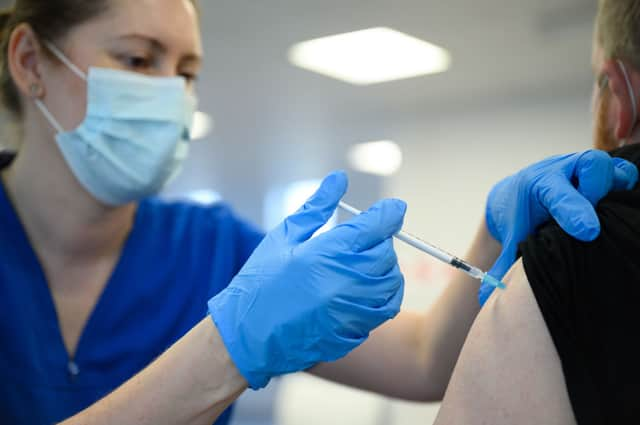Covid-19 booster jab trials at University of Birmingham - results revealed
This article contains affiliate links. We may earn a small commission on items purchased through this article, but that does not affect our editorial judgement.


The latest results from the world-first study COV-BOOST are published today (Friday, December 3) in The Lancet and have been key in shaping the UK booster jab programme, providing vital evidence for global vaccination efforts.
The trial investigated the safety, side-effects of, and immune response to, seven vaccines when used as a third Covid booster jab.
Advertisement
Hide AdAdvertisement
Hide AdCOV-BOOST was designed so that stored samples can be used in evaluating these vaccines’ effectiveness in neutralising any new variants of concern, and COV-BOOST samples have been made available to UKHSA for testing against omicron.
Trial participants received one of these boosters 10-12 weeks after their initial two-dose vaccination with either Oxford/AstraZeneca or Pfizer/BioNTech vaccines. A control group was given a meningitis vaccine to account for reactions not specific to the COVID-19 jabs.
The seven vaccines trialled were:
● Oxford/AstraZeneca
● Pfizer/BioNTech
● Moderna
● Novavax
● Valneva
● Janssen
● CureVac
Of these, only the Oxford/AstraZeneca, Pfizer/BioNTech, Moderna and Janssen vaccines are currently licensed for use in the UK. Half-doses of Pfizer/BioNtech, Novavax and Valneva were also tested.
The University of Birmingham trial, carried out in collaboration with University Hospital Southampton NHS Foundation Trust (UHS), found that six COVID-19 vaccines are safe and boost immunity for people who have had two doses of Pfizer/BioNTech or Oxford/AstraZeneca.


How many people took part in the Covid-19 booster trial?
Advertisement
Hide AdAdvertisement
Hide AdUniversity Hospital Southampton NHS Foundation Trust (UHS) led the trial which recruited over 2,800 participants aged 30 or over through National Institute for Health Research (NIHR)-supported sites, including one co-hosted by the University of Birmingham and University Hospitals Birmingham NHS Foundation Trust.
The study found that there were large differences in spike protein antibody levels after 28 days across the vaccines.
In people who had received two initial doses of the Oxford/AstraZeneca vaccine, these ranged from 1.8 times higher to 32.3 times higher with different booster vaccines.
For those who had received the Pfizer/BioNTech vaccine initially, the range was 1.3 times higher to 11.5 times higher. Booster results were similar for those aged 30 to 69 years and those aged 70 years or older.
Advertisement
Hide AdAdvertisement
Hide AdThe study also looked at immune T-cell responses. T-cells are likely to be important in controlling disease severity, although their impact on overall protection or longevity of immunity is not yet known.


Did the trail find any side effects to the Covid-19 booster jabs?
COV-BOOST reported T-cell responses in several combinations of initial and booster vaccines, however these were not predictable based on spike protein antibody levels.
Reactions to all seven vaccines were similar, with fatigue, headache, and injection site pain most often reported. These were more commonly reported by those aged 30 to 69. 912 of the 2,878 participants experienced a total of 1036 adverse events, only 24 of which were severe.
What did the experts who conducted the trials say?
Professor Saul Faust, trial lead and Director of the NIHR Clinical Research Facility at UHS, said: “Our side effect data shows all seven vaccines are safe to use as a third dose, with acceptable levels of ‘reactogenicity’ – inflammatory side effects like injection site pain, muscle soreness, fatigue.
Advertisement
Hide AdAdvertisement
Hide Ad“All seven boosted levels of spike protein antibodies significantly after two doses of the Oxford/AstraZeneca vaccine.
“However, only six also did so after two doses of Pfizer/BioNTech, (Oxford/AstraZeneca, Pfizer/BioNTech, Moderna, Novavax, Janssen and CureVac). There were also large variations in response with different boosters.
“It’s really encouraging that a wide range of vaccines, using different technologies, show benefits as a booster dose to either of these vaccines.
“That gives confidence and flexibility in developing booster programmes here and globally, with other factors like supply chain and logistics also in play.”


Advertisement
Hide AdAdvertisement
Hide AdDr Christopher Green, Senior Clinical Lecturer at the University of Birmingham and Consultant Physician in Infectious Diseases at University Hospitals Birmingham NHS Foundation Trust, said: “We are immensely pleased to have played our part in how vaccine research can rapidly respond to the needs of the public during this pandemic.
“The members of the West Midlands public who took part in this trial, as well as the many other vaccine trials we have conducted, deserve a special thanks for joining and supporting our team of researchers, and these trials are so important as we hope to stay one step ahead of the virus.”
Prof Faust added: “It’s important to note two things about these results. First, they only relate to these vaccines as boosters to the two primary vaccinations, not how well they work as first and second doses.
“Secondly, the data describe the immune response at 28 days, not vaccine effectiveness. The relationship between that response and long-term protection is still poorly understood. “We will be looking at the longer-term immune responses in COV-BOOST, conducting further tests at three months and one year after receiving boosters.
Advertisement
Hide AdAdvertisement
Hide Ad“We are also looking at whether a longer period between second and third doses improves response to the two of the booster vaccines.
“Several studies have shown this effect between first and second doses. We’ve done that by giving some of our original control participants the booster at a later point, and we expect those results to be available in the New Year.”
Professor Andrew Ustianowski, National Clinical Lead for the UK NIHR COVID Vaccine Research Programme, said: “Heading into the winter, and due to the emergence of the Omicron, the results from COV-BOOST are extremely timely and of national and international importance.
“Since the beginning of the pandemic NIHR and the NHS have been supported by the efforts and selflessness of study participants - helping us to identify the most effective vaccines and how they can be used flexibly to protect more people.
Advertisement
Hide AdAdvertisement
Hide Ad“We welcome the latest results from the study, and continue to support the COV-BOOST team with the further analysis of data which will help us understand the use of these vaccines as boosters long term.”
A message from the editor:
Thank you for reading. BirminghamWorld is Birmingham’s latest news website, championing everything that is great about our city - reporting on news, lifestyle and sport. We want to start a community among our readers, so please follow us on Facebook,Twitter and Instagram, and keep the conversation going.
Comment Guidelines
National World encourages reader discussion on our stories. User feedback, insights and back-and-forth exchanges add a rich layer of context to reporting. Please review our Community Guidelines before commenting.
